The Second Missionary Tour
Continued
|
Translation
|
|
Commentary |
|
Paragraph 1. PARTIAL SUCCESS AT THESSALONICA. Verses 1-9.
|
|
Now, when they had passed through Amphipolis and Apollonia they arrived at Thessalonica, where they found a Jewish synagogue. Following his custom, Paul went to it, and for three Sabbaths discussed with them matters from the Scriptures, fully explaining to them and quoting passages to prove that the Christ had to ‘suffer and to rise again from the dead.
“And this Jesus,” said he, “of whom I am telling you, this is the Christ Himself.” Some of them were persuaded, and threw in their lot with Paul and Silas, including a great throng of devout Greeks and not a few of the leading women. The Jews, however, roused to jealousy, assembled some worthless fellows from the streets, and when they had formed a mob kept the city in a continual uproar. They even attacked Jason’s house and tried to bring out Paul and Silas before the populace. But when they could not find them they proceeded to drag Jason and some of the brothers before the Politarchs, shouting loudly,
“These men who have set the world upside down have reached here. Jason has welcomed them, and they all set aside the authority of Cesar, declaring that there is an entirely different Emperor than he—a man called Jesus.”
When they heard these things, both the crowds and the Politarchs were alarmed, and after binding over Jason and the rest to keep the peace they let them go.
|
|
Paul, Silas, and Timothy, and, we believe, Luke, determined that they would press on to a city, before settling down again, where there were more Jews and the atmosphere and basis of a synagogue to work with. Probably for this reason they did not stop more than a day or a night in the otherwise important and inviting cities of Amphipolis and Apollonia but passed on to Thessalonica. Here they found a great colony of Hebrews and a well-established synagogue. Going to worship with their fellow countrymen, as was the custom of Paul and Silas, they soon felt free to make known their new views about the meaning and fulfillment of the Scriptures, and for three weeks the usual course of gradually winning a considerable number of Jews to their opinion and a much larger contingent of proselytes and well-to-do women followed. There were, however, far larger numbers who would not accept the truth, but they felt that they had to resort to unscrupulous and very extreme measures to stem the rising tide. They succeeded in actually raising a mob movement in the market place quite like that at Philippi, “setting the whole city in an uproar.” The host of the Apostles was evidently a Jew named Jason, and to his house the rabble is led for mischief. Not finding Paul or Silas, who were fortunately out, they lay hold of Jason himself and some other of the recent converts, dragging them before the Politarchs, charging them with sedition in harboring and abetting foreigners who openly taught allegiance to a greater Emperor than Cæsar. The speakers evidently knew in some way of the widespread preaching and the transforming effect of the gospel which. had already turned many communities “upside down,” and no doubt enlarged freely upon the fact. Possibly some traveling magician from Philippi had taken a share in the situation. Jason and his friends, of course, could not be imprisoned or punished, but the
law strangely enough made it possible for those peaceable men to be placed under bonds to keep the peace, and this was done to appease their warlike fellow townsmen.
|
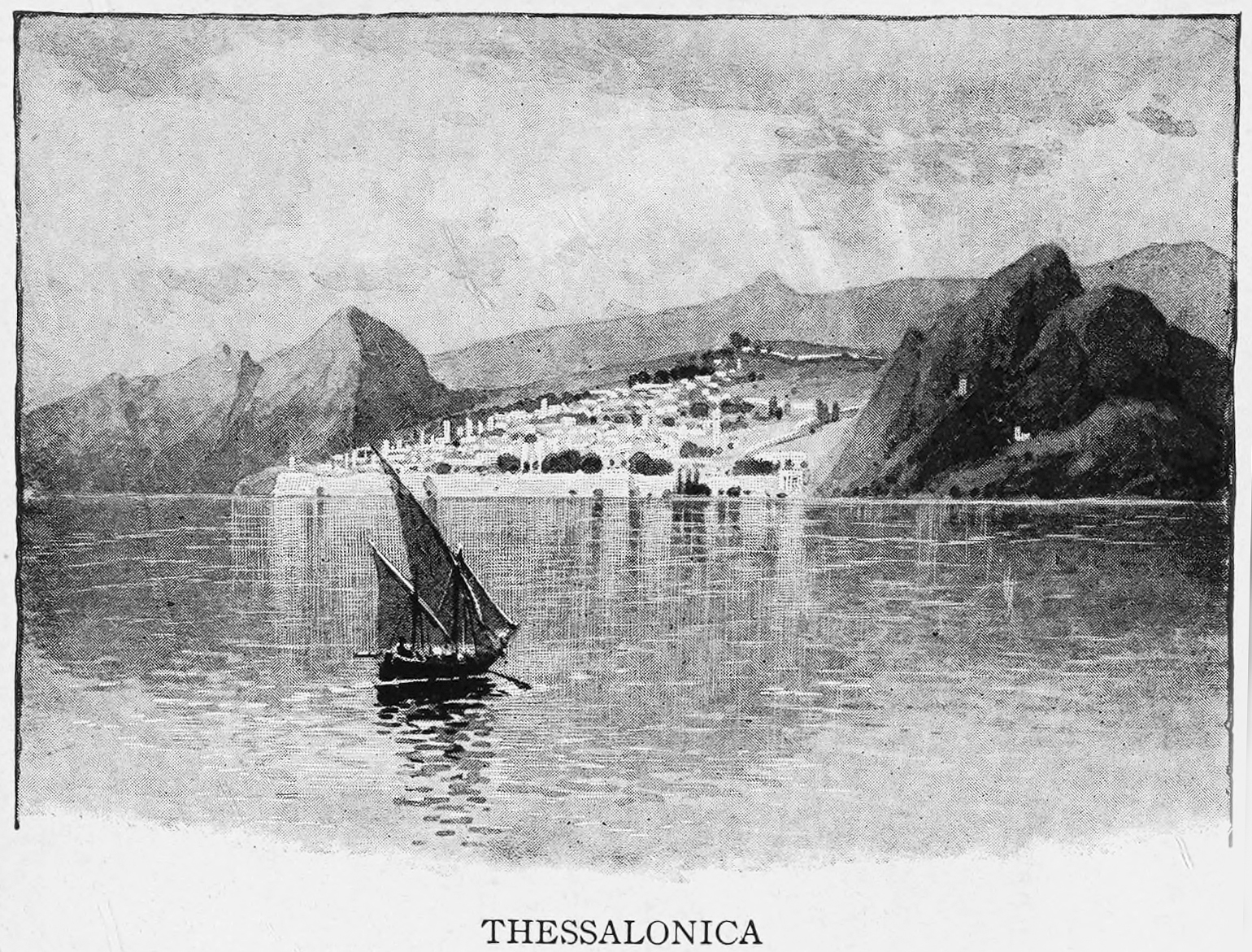
THESSALONICA |
Translation
|
|
Commentary |
|
Paragraph 2. PREACHING CONTINUED AT BERŒA. Verses 10-15.
|
|
That night the brothers sent off Paul and Silas to Berœa. When they reached there they went to the Jewish synagogue, whose members were nobler-minded than those in Thessalonica, for they received the Word with all eagerness of mind, and day by day searched the Scriptures to see if the new teaching were true. In this way many came to believe as well as a considerable number of Greek women of prominence, and of men. When, however, the Jews of Thessalonica learned that Paul had openly preached the Word of God in Berœa, they came there also, and roused the mobs to the point of riot. Immediately then the brothers sent off Paul on his way to the sea, but Silas and Timothy stayed right there. Those who were escorting Paul accompanied him as far as Athens, and then returned, taking a message to Silas and Timothy to join him as soon as possible.
|
|
That night Paul and Silas were informed of the state of things, and little as they relished it, at once determined to relieve their friends of any further annoyance, and to this end left the city. Though going in haste, of course ample provision was made for their comfort and attendance on the journey down to
Berœa, a rather secluded town, about fifty miles southwestward, and where probably it was known that the Jews of the local synagogue were more truly pious and devout. In any case, they were conveyed directly to the synagogue and found the conditions there most agreeable. Nothing could please Paul more than to find his countrymen tenacious and deeply concerned in their interest in rightly understanding and obeying the Word of God. We have here the true key to his custom of going first to the synagogue and taking up the Scriptures as the basis of all his appeals to his fellow Jews. His success everywhere with open-minded and intelligent readers of the Old Testament is proof of his power, no less than the extreme enmity which he evoked everywhere on the part of bigoted or ignorant literalists. Again at
Berœa, success comes so completely and so soon that news, reaching the metropolis Thessalonica at length of Paul’s preaching the word of God in that rustic town, stirs up again the fires of fanaticism and the battle is opened anew. To avoid any unseemly and unprofitable controversy immediate flight is planned; the fact of Paul’s friends taking full charge and going on with him to Athens also suggests that he was not physically in fighting trim, and his sending back for Timothy and Silas to come to him soon points in the same direction. Despite the widespread opinion that Luke was still in Philippi, we see no convincing proof that he was not Paul’s closest companion through all of these scenes, and especially at Athens.
|
Translation
|
|
Commentary |
|
Paragraph 3. PAUL'S EXPERIENCE AT ATHENS. Verses 16-22.
|
|
While Paul awaited them in Athens his soul was roused within him as he observed that the city was full of idols. So he began to discuss with the Jews and devout-minded, and also day by day with those he happened to meet in the market place. There also encountered him some of the Epicurean and Stoic philosophers, some of whom asked,
“What would this philosophic scrap-collector say?”
Others said,
“He seems to be advance agent for some foreign deities.'”
This last was because he kept preaching the good news about “Jesus” and “the resurrection.” At length they took him with them to the Areopagus, asking:
“Can we know what this sort of teaching of which you are telling is? For you are bringing to our attention matters which sound
strange to us. We therefore wish to know just what they mean.” (Now all the Athenians used to give their whole leisure to nothing so much as to telling about or listening to the latest novelty.) So Paul took his stand in the middle of the Areopagus and said:
|
|
Why Paul was left in Athens alone in any case, and especially if one of his sick turns had seized him, is difficult to understand.
In case he were ill and in Dr. Luke’s charge, and had gone to Athens at least partly because it was a place where drugs, baths, and advice might be had, as well as one where his mind might be entertained, all is plain. He does not seem to have planned any very serious labor at Athens, and this does not agree with as energetic a spirit in such an illustrious center of the world’s thought unless he were there for rest and recuperation. Be that as it may, however, Paul was soon out of his lodgings and was wandering all about that great city filled with wonder and admiration at the extent of its interest in problems other than commercial. He found it to be a veritable pantheon—its shrines, temples, altars, statues, at least superficially proclaimed an interest in every form and phase of religion such as he had not elsewhere seen. The great Greek traveler Pausanias says that in his day the Athenians had more than other Greeks a zeal for religion, and Petronius, the Latin critic, is said to have sarcastically remarked that it was easier in Athens to find a god than a man. Paul had leisure to read the inscriptions and even quite thoroughly to go over the city, amazed at the ingenuity and variety of workmanship and indication of taste displayed in deifying every virtue, passion, and aspiration of the human mind. He even found an altar dedicated in due form to “A God Unknown.” Now, to claim that Paul had no archæological interest in this great city, and nothing but a spirit of disgust with its manifestation of devotion to art, is certainly gratuitous in view of his wide rambles and observations, and especially in view of the fact that he himself at length found and read in that veritable forest of inscribed pedestals one inscribed to “A God Unknown.” Paul was awaiting his fellow workers and traveling companions in Athens, therefore he was not there for work, but because it was a good place in which to wait. His spirit, however, was quickened by his surroundings and he began to work. He entered the local synagogue and stirred up both orthodox and proselytes, and on week days went among the groups of men in the market places and public squares, talking familiarly with them in Greek and often more or less formally as he had been wont to do in the market towns of Asia Minor. So common a figure did he become in the open-air debates about the Agora that he was more or less widely spoken of as “The Jesus Man,” or “The Resurrection Preacher,” or “That Eccentric Hebrew,” or “The Miscellaneous Philosopher,” or “The Religious Scrap Collector’—the term depending on the viewpoint of the observer. Finally the philosophers
going and coming across the Agora became casually interested and then fascinated with this strange and rapid speaker with his Cilician brogue yet excellent vocabulary and ideas. Several of them, both Stoics and Epicureans, being members of the Areopagus, decide to ask him to come to their common meeting place and speak especially to them, and as they seem altogether courteous and sincere in their request, he consents.
|
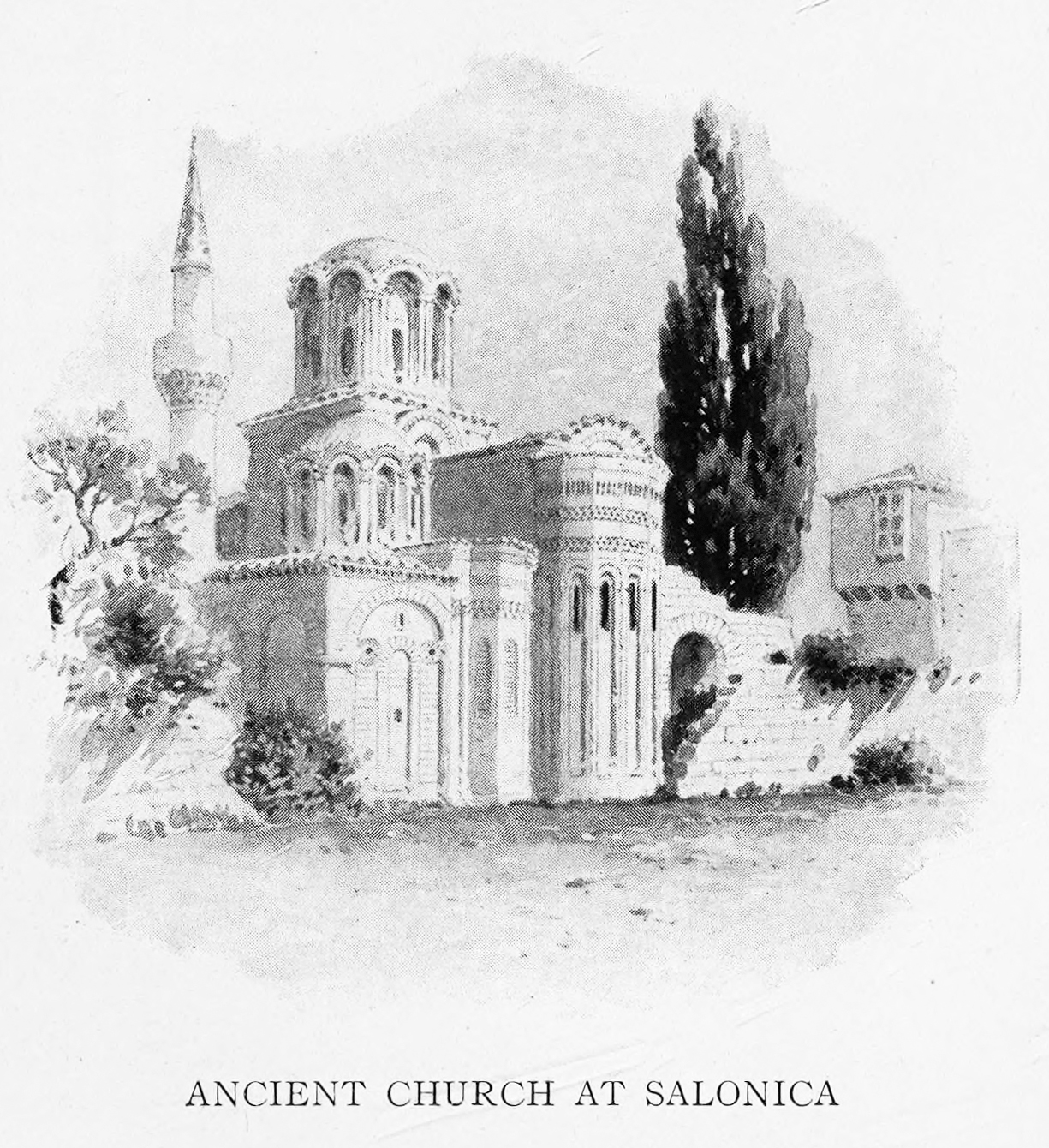
ANCIENT CHURCH AT SALONICA |
Translation
|
|
Commentary |
|
Paragraph 4. PAUL'S ADDRESS TO THE AREOPAGUS. Verses 23-34.
|
|
“Men of Athens, I observe on all hands how very religious you are. For as I was going along and looking at your objects of worship I even found an altar with the inscription: “To an Unknown God.’ Whom, then, you worship without knowing Him, I am now proclaiming to you. The God who made the world and everything in it, since He is Lord of Heaven and earth, does not dwell in man-made shrines, nor is He served by human hands as though He lacked anything, for He is the One who gives to all men life and breath and everything else. Moreover, He made from one source every race of men to live on all the face of the earth, and determined their allotted seasons and the limits of their settlement, so that they might search for God if perchance they might feel
their way to Him and find Him, especially as He is not far from every one of us. For it is in Him that we live and move and exist, just as some of your own poets have said,
‘For His OFFSPRING ALSO ARE WE.’
So then, since we are God’s offspring, we ought not to think the divine nature resembles gold or silver or marble, or anything created by human art or invention.
“Having, then, overlooked those times of ignorance, God now enjoins upon all men everywhere to repent. He has even gone so far as to set a day on which He is about to judge the world in righteousness, in the person of a Man Whom He has destined for the purpose; and He has given every-one proof of this by raising Him from the dead.”
When, however, they heard of a resurrection of dead men some began to jeer, but others said,
“We will hear you about that again some time.”
Then Paul withdrew from the assembly. But some of the members joined him and believed, and among these were the Areopagite Dionysius and a woman named Damaris, and with them there were others of lesser standing.
|
|
The Areopagus was no doubt the name both of a kind of commission on morals and of a hill or eminence opposite the west front of the Acropolis, where they were wont to assemble. Paul is presented in due form to the gathering, which undoubtedly included many not regular members that day, and, taking his stand in the center of the group, made a speech which for grace, dignity, thought, and quotability, passes anything of equal length in letters. Of course Luke gives us but the introduction and general line of thought, but he does it so well that we need no more. In the account Paul states the argument against idolatry in unanswerable form, declares the spirituality of the one supreme God in terms that their own poets had employed, preaches the guilt of sin and demand for repentance, proclaims righteousness as the only standard of morals, Jesus the sole Judge in the Day of Judgment, and His resurrection the proof of His power and the hope of our immortality. What other or more serious subjects could Paul have introduced? As usual, his hearers fall into two opinions: the one scoffs and goes away, the other lingers to have further conference and gladly believes. Among the latter are a man and
a woman of the highest social and intellectual standing in Athens, and many others of lesser rating in Athenian society but whose names are written in the Lamb’s Book of Life. And from that visit of Paul to Athens sprang a church which has surely equalled in stability and influence any other which even his strategic skill ever planted. At the Parliament of Religions in Chicago, in 1893, the Greek Bishop of Xante presented an argument based upon irrefutable historical data that the church of Dionysius and Damaris in Athens had continued an unbroken course from its founding at the hands of Paul to the present day.
|
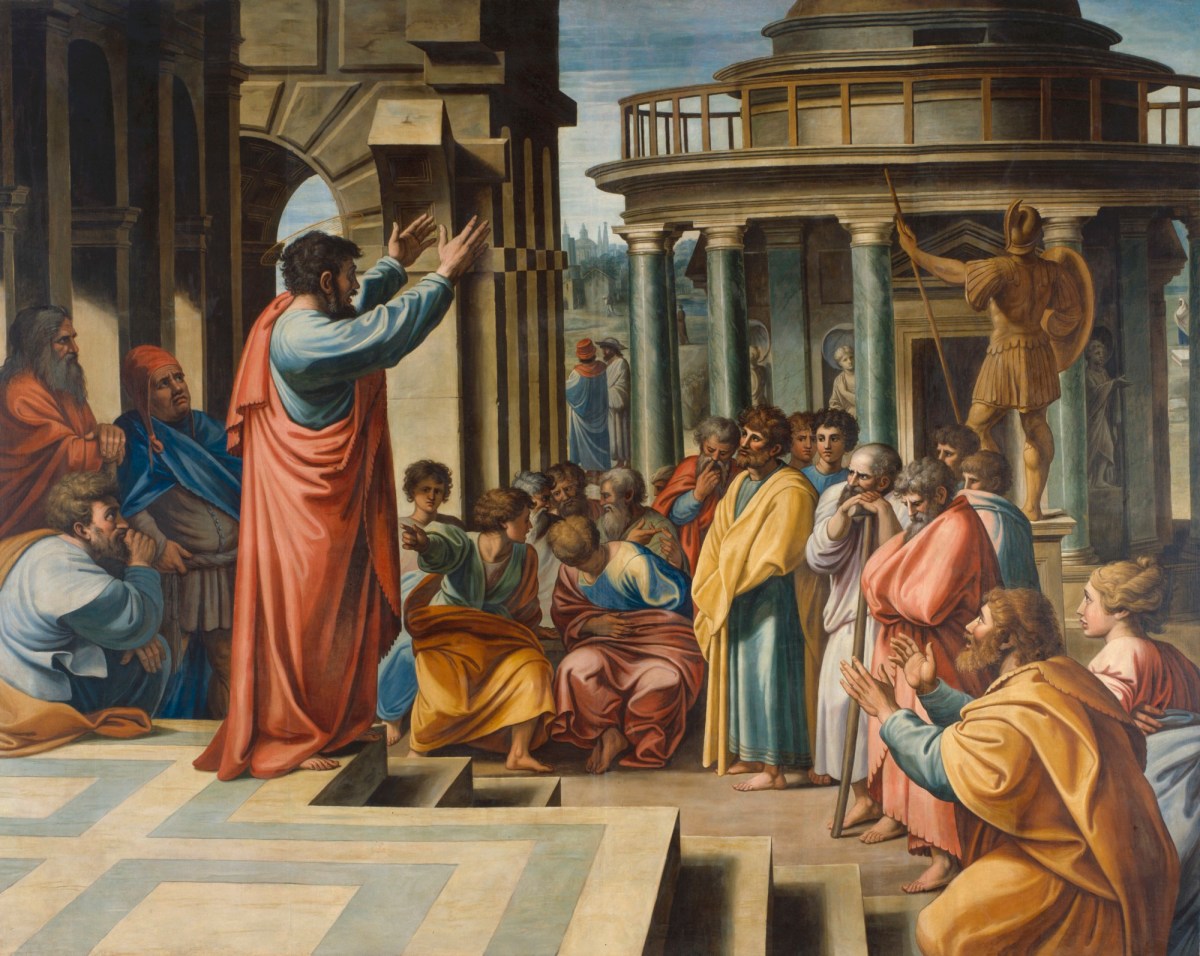
PAUL BEFORE THE AREOPAGUS |
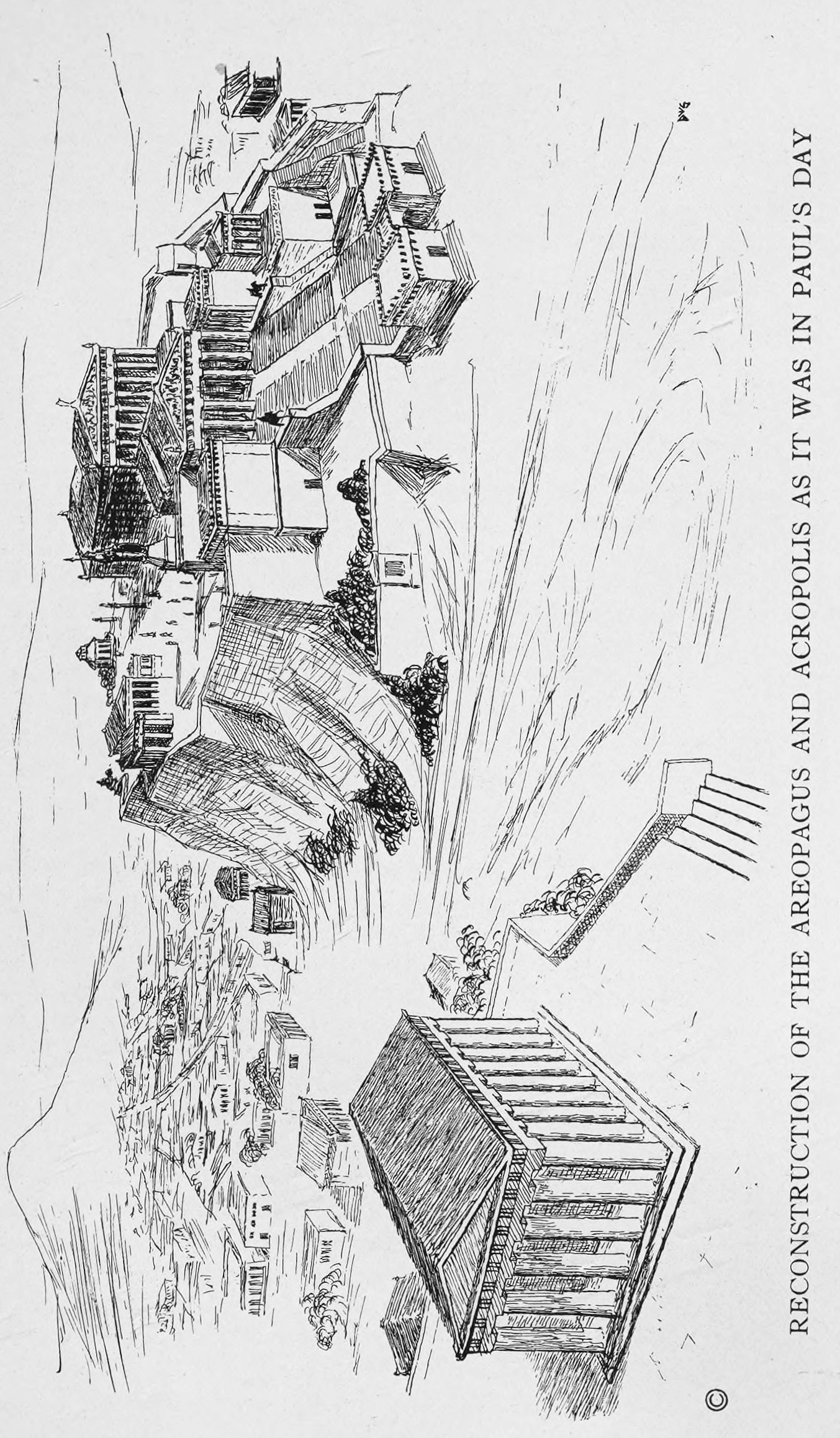
RECONSTRUCTION OF THE
AREOPAGUS AND ACROPOLIS AS
IT WAS IN PAUL'S DAY |
|
|
|
|
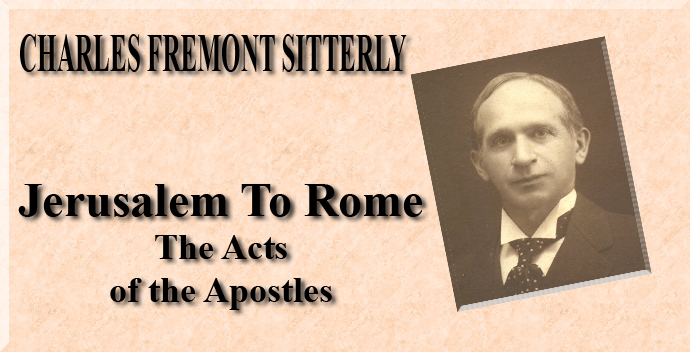


 Home
Home What's New
What's New Bible
Bible Photos
Photos Hiking
Hiking E-Books
E-Books Genealogy
Genealogy Profile
Free Plug-ins You May Need
Profile
Free Plug-ins You May Need
 Get Java
Get Java.png) Get Flash
Get Flash Get 7-Zip
Get 7-Zip Get Acrobat Reader
Get Acrobat Reader Get TheWORD
Get TheWORD


